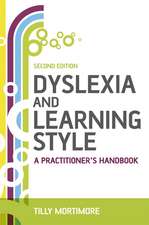Education in South America: Education Around the World
Prefață de Dr Colin Brock Editat de Simon Schwartzmanen Limba Engleză Paperback – 7 sep 2016
| Toate formatele și edițiile | Preț | Express |
|---|---|---|
| Paperback (1) | 320.85 lei 3-5 săpt. | |
| Bloomsbury Publishing – 7 sep 2016 | 320.85 lei 3-5 săpt. | |
| Hardback (1) | 917.33 lei 6-8 săpt. | |
| Bloomsbury Publishing – 20 mai 2015 | 917.33 lei 6-8 săpt. |
Din seria Education Around the World
- 8%
 Preț: 313.74 lei
Preț: 313.74 lei - 8%
 Preț: 315.17 lei
Preț: 315.17 lei - 8%
 Preț: 315.17 lei
Preț: 315.17 lei - 7%
 Preț: 320.85 lei
Preț: 320.85 lei - 18%
 Preț: 315.33 lei
Preț: 315.33 lei - 18%
 Preț: 315.17 lei
Preț: 315.17 lei - 13%
 Preț: 256.12 lei
Preț: 256.12 lei - 37%
 Preț: 914.95 lei
Preț: 914.95 lei - 13%
 Preț: 316.11 lei
Preț: 316.11 lei - 8%
 Preț: 319.44 lei
Preț: 319.44 lei - 8%
 Preț: 316.11 lei
Preț: 316.11 lei - 8%
 Preț: 315.17 lei
Preț: 315.17 lei - 8%
 Preț: 316.11 lei
Preț: 316.11 lei - 37%
 Preț: 187.87 lei
Preț: 187.87 lei - 43%
 Preț: 631.21 lei
Preț: 631.21 lei - 43%
 Preț: 727.31 lei
Preț: 727.31 lei - 43%
 Preț: 631.21 lei
Preț: 631.21 lei - 44%
 Preț: 187.30 lei
Preț: 187.30 lei - 37%
 Preț: 910.69 lei
Preț: 910.69 lei - 37%
 Preț: 917.83 lei
Preț: 917.83 lei - 37%
 Preț: 912.59 lei
Preț: 912.59 lei - 37%
 Preț: 916.85 lei
Preț: 916.85 lei - 36%
 Preț: 172.36 lei
Preț: 172.36 lei - 36%
 Preț: 171.32 lei
Preț: 171.32 lei - 12%
 Preț: 234.20 lei
Preț: 234.20 lei - 8%
 Preț: 318.95 lei
Preț: 318.95 lei
Preț: 320.85 lei
Preț vechi: 346.35 lei
-7% Nou
Puncte Express: 481
Preț estimativ în valută:
61.40€ • 64.26$ • 51.10£
61.40€ • 64.26$ • 51.10£
Carte disponibilă
Livrare economică 10-24 martie
Preluare comenzi: 021 569.72.76
Specificații
ISBN-13: 9781474270632
ISBN-10: 1474270638
Pagini: 480
Dimensiuni: 156 x 234 x 28 mm
Greutate: 0.79 kg
Editura: Bloomsbury Publishing
Colecția Bloomsbury Academic
Seria Education Around the World
Locul publicării:London, United Kingdom
ISBN-10: 1474270638
Pagini: 480
Dimensiuni: 156 x 234 x 28 mm
Greutate: 0.79 kg
Editura: Bloomsbury Publishing
Colecția Bloomsbury Academic
Seria Education Around the World
Locul publicării:London, United Kingdom
Caracteristici
Discusses education development in individual countries alongside local, regional and global contexts
Notă biografică
Simon Schwartzman is Researcher at the Institute for Studies on Labor and Society, Brazil. Previously, he was Professor of Political Science at the University Research Institute, Rio de Janeiro, Brazil and the University of São Paulo, Brazil, and President of Brazil's National Statistical Office.
Cuprins
Series Editor's Preface, Colin Brock (University of Durham, UK)Introduction: Regional Overview, Simon Schwartzman (Institute for Studies on Labor and Society, Rio de Janeiro, Brazil)1. Argentina: Public Policies in Education 2001-2014, Juan Carlos Tedesco (National University of San Martín, Argentina)2. Argentina: Rethinking Government Models of Education, Silvine Gvirtz, Angela Ines Oria and Esteban Torre (Equality Connect ,Conectar Igualdad, Buenos Aires, Argentina)3. Bolivia: Perspectives and Challenges for Multicultural Education, Fabricia de Andrade Ramos and Mauricio Blanco Cossio (AFortiori Institute, Rio de Janeiro, Brazil)4. Brazil: The Roles of States and Municipalities in the Implementation of Education Policies, Maria Helena Guimarães de Castro (State Foundation for Data Analysis [SEADE], São Paulo, Brazil)5. Brazil: Curriculum of Basic Education, Guiomar Namo de Mello (State Board of Education, São Paulo, Brazil)6. Brazil: Why José Can't Read, João Batista Araújo e Oliveira (Alfa e Beto Institute, Brazil)7. Brazil: Costs and Economic Benefits of Education, Fernando Veloso and Fernando de Holanda Barbosa Filho (Brazilian Institute of Economics, Getúlio Vargas Foundation, Brazil)8. Chile: The Evolution of Educational Policy, 1980-2014, Cristián Bellei and Xavier Vanni (University of Chile, Santiago)9. Chile: Effectiveness of Teacher Education, Beatrice Ávalos (University of Chile, Santiago) 10. Chile: The Quality of For-Profit Schooling, Gregory Elacqua (Universidad Diego Portales, Santiago, Chile)11. Colombia: Upper Secondary Education Reform. Martha Laverne Toscano (Formerly Senior Education Specialist at the World Bank)12. Colombia: Public-Private Partnership to Support Decentralized Education, Santiago Isaza (Luker Foundation, Manizales, Colombia)13. Colombia: Comprehensive Care for Early Childhood, Marina Camargo Abello (La Sabana University, Bogotá, Colombia)14. Ecuador: Learning to Work Together, Orazio Bellettini, Adriana Arellano and Wendy Espín, Grupo FARO, Quito, Ecuador15. Ecuador, 2007-2014: Attempting a Radical Educational Transformation, Pablo Cevallos Estarellas and Daniela Bramwell (San Francisco de Quito University, Ecuador)16. Paraguay: An Overview, Cynthia Brizuela (National University of Pilar, Paraguay)17. Peru: Impact of Socioeconomic Gaps in Educational Outcomes, Santiago Cueto, Juan León and Alejandra Miranda (Group for Analysis and Development [GRADE], Lima, Peru)18. Uruguay: The Teachers' Policies Black Box, Denise Vaillant (University ORT, Montevideo, Uruguay)19. Venezuela: Political and Institutional Transition, 1999-2014, Mabel Mundó (Central University of Venezuela, Caracas)Index
Recenzii
Education in South America accomplishes the feat of providing rich an insightful account of education's key issues in ten national cases of recognized diversity and complexity, whilst at the same time uncovering key commonalities in their grappling with the quality and equity agendas which shape their policies. From macro issues of governance and how weak democratic politics affect policies, to the ideological basis of much of debates and policy answers regarding curriculum and instruction, and the vastness of the capacity challenge which confronts the teaching corps of the region, editor Simon Schwartzman and his contributors have produced a comparative appraisal of unparalleled value.
This book offers a rich collection analyzing the development and performance of education systems in South America, and the key developments in education policies in recent decades. It is an invaluable resource offering a comparative perspective of the educational achievements and challenges facing the countries of this region. A must read for policy analysts and education leaders, for comparative educators and for anyone interested in understanding the people of Latin America, and how their knowledge, skills and mindsets are shaped by the educational culture, practices and policies brilliantly examined in this compendium.
Education in South America offers an historical perspective on the state of education in ten South American countries.providing country-level analyses, written by local experts, of the current educational climate in this region. The individual chapters accomplish the editor's goal of highlighting both the improvements that have been made and those that are yet to be realized through a combination of policy analysis and cross-national comparison. . Overall, the book provides a vision for social development in South America by calling for improved policy implementation and the allocation of resources to the priority area of providing high-quality education across the region.
This book offers a rich collection analyzing the development and performance of education systems in South America, and the key developments in education policies in recent decades. It is an invaluable resource offering a comparative perspective of the educational achievements and challenges facing the countries of this region. A must read for policy analysts and education leaders, for comparative educators and for anyone interested in understanding the people of Latin America, and how their knowledge, skills and mindsets are shaped by the educational culture, practices and policies brilliantly examined in this compendium.
Education in South America offers an historical perspective on the state of education in ten South American countries.providing country-level analyses, written by local experts, of the current educational climate in this region. The individual chapters accomplish the editor's goal of highlighting both the improvements that have been made and those that are yet to be realized through a combination of policy analysis and cross-national comparison. . Overall, the book provides a vision for social development in South America by calling for improved policy implementation and the allocation of resources to the priority area of providing high-quality education across the region.















